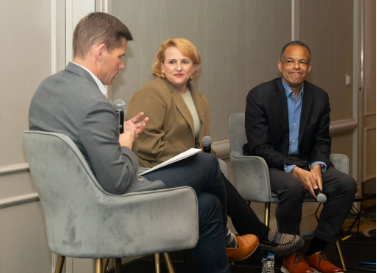Recap: 2025 AMERIPEN Annual Summit

Last week, our sustainability team traveled to Alexandria, Virginia, to attend the 2025 AMERIPEN Annual Summit. There, they had a front-row seat to some of the most critical conversations happening in packaging today, led by industry leaders, policymakers, and advocates for science-based policies. This event came at a time when extended producer responsibility (EPR) laws are in the spotlight and more states are looking to these policies as tools for funding infrastructure and driving the adoption of sustainable packaging.
A clear takeaway from the summit was the importance of partnership. Collaborating through organizations like AMERIPEN gives the industry a unified voice and ensures that policy is informed by real-world expertise and science. This is especially vital in a rapidly evolving landscape.
Here are a few other themes that stood out to us during the summit:
Pause and Learn. While there’s momentum to accelerate EPR rollouts, panelists urged caution: it’s one thing to pass a law, but quite another to get it up and running. States currently implementing EPR are learning about execution, stakeholder engagement, and how to make these systems actually work. There's a strong feeling that taking time to analyze what's working and what’s not will make future EPR laws more impactful.
Harmonization. Right now, every state seems to be taking its own approach, which creates a patchwork of rules that's tough for producers to navigate. The consensus: before pushing for broad-based, national legislation, we need to learn from early adopters and aim for greater consistency across states.
Transparency. From tracking where EPR funds are going to ensuring all producers register and share costs fairly, clarity is non-negotiable. Early adopters shouldn't be left footing the bill while others hold back.
Consumer education. No matter how good the infrastructure or innovative the packaging, progress stalls if consumers don't know what to do with materials at the end of life. Making recycling and disposal instructions clear and accessible is key.
The message was clear: the future of packaging policy depends on collaboration, learning from the states out in front, and keeping both science and practicality at the center of every decision. In an environment where regulations and expectations are changing fast, partnerships like those fostered by AMERIPEN are essential for advocating for policies that actually work for the industry, for consumers, and for the planet.
For more information on AMERIPEN, visit: https://www.ameripen.org/







